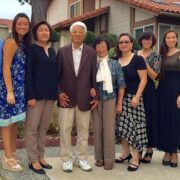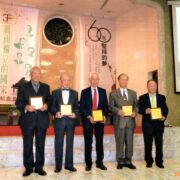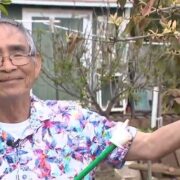A Country Girl from Sigoushui
Author: Christine Yang 林壽英
During the Japanese occupation of Taiwan, after my father returned from studying in Japan and married my mother, they returned to their ancestral home, a small Hakka farming village called Sigoushui 泗溝水 in Pingtung County, to live with my widowed grandmother. Following this, my father served at a malaria research institute in Chaozhou 潮州 operated by the World Health Organization (WHO). My father rode his bike between Sigoushui and Chaozhou every day for work. Therefore, we rented all of our family’s farmland to tenant farmers for cultivation; my mother only retained one garden and one orchard to cultivate on her own. My mother gave birth to seven children in a row; I was the third, with an elder sister and brother before me and three younger brothers and a younger sister after. When we were little, we had to walk half an hour on foot to get to Wanluan Elementary School 萬巒國民學校. There was a river between Sigoushui and Wanluan, over which pedestrians walked on a small wooden bridge; we too had to cross the bridge on our way to school, but in the rainy season the river often rose and submerged the wooden bridge, so that there was no way to cross. During these times, a ferry man would help people over the river on a bamboo raft. I have many vivid childhood memories of boarding the raft to cross the river. In those days village children always walked barefoot and walking to school was no exception. It was only in the evening after we had washed up that we put on wooden clogs; as such I can safely say I never wore shoes to school.
After graduating from Wan Luan Elementary School, I tested into Ping Tung Girl’s High, in the city. Because it was far from home and transportation was inconvenient, my parents sent me, only 12-years-old at the time, to live in the student dormitory. I only came home on weekends. When my parents sent me to the dormitory, besides my clothes and daily necessities, they also brought me to the Pingtung market and bought me a pair of pretty cloth shoes. When they were about to depart the admonished me, “The city kids all wear shoes. You need to wear your shoes to school if you don’t want them to look down on you.” Yet I, who had never worn shoes before, was unaccustomed to having to wear shoes to go to school; it was painful to have my toes squeezed into a pair of shoes. After only two days blisters had formed on my toes and heels, making it extremely painful to walk. But I couldn’t not wear shoes, nor could I just not go to school. When I was sleeping in the dormitory, I often hid in my blankets and cried – on the one hand, I was missing home, was missing my parents and siblings and playmates in the village; on the other hand, it was because my feet hurt so much. When I had to get up the next day and put my shoes back on to go to school, I regretted that I had been accepted into Ping Tung Girl’s High.
I remember my first day at Ping Tung Girl’s High, I didn’t know a single person in my class, yet it seemed they all knew each other. Later I found out most of my classmates all came from Zhongzheng Elementary, Ren’ai Elementary, the affiliated experimental elementary school of Pingtung University, or the elementary school for children with parents serving in Air Force, all in the city. I was the only person from the countryside (that year girls from the countryside who tested into more elite middle schools were mostly sent to Ping Tung Girls’ High branch school in Xishi (西勢), but in order to make it so I could attend the main school my father moved my official residency to my uncle’s house in Pingtung city). During breaks after class the classmates all formed cliques and hung out together – no one even paid attention to my existence. They all ignored me. Then, after our first monthly quiz, our class advisor Chingle Lu 呂清樂, who also taught biology, called out for “Shouying Lin” 林壽英 to stand as soon as he walked into the class. I jumped in my seat and timidly stood up. Teacher Lu then said I had a perfect score on the monthly biology quiz. Instantly my classmates all looked over at me; it was as if they just now realized there was a country girl called Shouying Lin in their class.
In my three years of middle school, besides the first semester, I was consistently the class president. At a young age I often heard my father praise the first Chairman of Taiwan Province (1949-1953) Mr. Kuochen Wu 吳國楨, saying Mr. K. C. Wu was a politician who had received Western education (he was a doctoral graduate of political science from Princeton University), had democratic values, and would speak for Taiwan. In the period that K. C. Wu served as the first Chairman of Taiwan Province under the power of Chiang Kai-shek, he once visited the WHO malaria research center in Chaozhou, Pingtung, giving me a deep impression of his name. In 1958, I graduated from junior high. I was exempted from the test due to excellent grades and admitted directly to Ping Tung Girl’s Senior High. Though I didn’t need to take the written test I still had to pass an oral exam. My examiner was dean of academic affairs Suichi Mai 麥穗歧; I don’t remember most of the questions he asked, but one question remains vivid in my mind as if it were painted there – he asked me who was the modern figure that I admired the most? Without hesitation, I answered that it was Mr. K. C. Wu. Mr. Mai was shocked, sternly thundering at me, “Don’t you know K. C. Wu is a national traitor? How can you admire him!” (Note 1). I was so frightened I couldn’t say a word. Then Mr. Mai said, “I am concerned you are young and ignorant, but you must never mention K. C. Wu again. Do you understand?”15-years-old at the time, this incident made me feel that the ruling powers were frightening, as was the Kuomintang (KMT) party. Therefore, in all my years studying before I went abroad, no matter how much the instructors in school tried to coerce and lure me into joining the KMT, I always tactfully refused and never compromised.
Influenced by my father, I hoped to work at the malaria research institute after graduating from college, so in my final year of high school I chose group C courses (sciences) with biology as my first choice. In my three years at Ping Tung Girl’s Senior High I continued to serve as class president. Yet the school authorities at Ping Tung Girl’s High not only didn’t add coursework for high school seniors hoping to go to university, but even often gave us some sort of current affairs test, hindering our concentration on the university entrance exam. This disgusted me, so I gathered all class presidents and some other classmates of senior classes to strike from taking the current affairs test. The 1960s was the beginning of the White Terror era; the ruling KMT authorities regarded strikes from tests, class, or work as severe rebellious activities. Young and naïve, I had opened the gates to disaster. Even my father was called in for interrogation to see if there was anyone pulling the strings behind the strike. My striking incident was nearly recorded as a major demerit and I had to stay in school for investigation; fortunately, my class advisor Chiping Lu呂治平, a veteran KMT military officer and a member of the Mongolian and Tibetan Affairs Comisison, interceded and spoke up for me. In the end I only had to write an essay of regret. After high school graduation I was admitted into the Entomology Department of Chung Hsing University in Taichung City.
I lived in the girls’ dormitory on campus in college. There were two female instructors in charge of the resident students, who also gave us each our conduct score each semester. Because I was not willing to enroll in the KMT, my conduct score always only barely passed with a score of sixty-some percent. Even though I had excellent academic performance, I could never apply for a school scholarship because my conduct score was so low. During my first year, my English teacher was an American professor called Ms. Simpson. For class purposes, she gave us all an English name; mine was Christine. When I studied abroad in the US and got married, I continued to use this name, and adopted Yang 楊 as my surname. My formal English name thus became Christine Yang, completely different from my premarital Chinese name Shouying Lin 林壽英. From my first employment in the US up until recently, I submitted articles to the Taiwan Tribune published in the US (no longer printed) and the Pacific Times under the pen name “Yang Yuting”(楊雨亭).
In the first semester of my final year of college, I met my current husband Maochia (Walter) Yang楊茂嘉; our encounter was like fate pulling us together from 1000 miles distance. At the time, he was serving on the air force in Taichung after graduating from the Mechanical Engineering Department of National Taiwan University, and was actively preparing to study abroad in the US. While we were dating, he encouraged me to prepare for the overseas students’ exam and later go to the US to study, so I changed my plan to work at the malaria research institute and planned to study abroad. In summer of 1965, I graduated from college, and Walter Yang received a scholarship from the Department of Materials Science of Northwestern University in a northern suburb of Chicago, Illinois. Before he left, we decided to get engaged, with the approval of both of our parents. Once I graduated I started working at the U.S. Naval Medical Research Unit 2 next to the Medical School of National Taiwan University on Gongyuan Rd in Taipei, while actively preparing to go abroad. Many employees at the U.S. Naval Medical Research Unit were college graduates preparing to go abroad. After working for two years (in 1967), I was admitted by Northwestern University (but with no scholarship) as well as University of Mississippi, with a scholarship. I decided to leave my job and go abroad to study.
My fiancée was completing his PhD at Northwestern University, so I decided to spend my summer vacation of that year starting in May in Chicago, and when the fall semester started in August I would move to Mississippi. Northwestern University is located in the town of Evanston, on the banks of Lake Michigan – the campus is gorgeous. After spending several fresh, relaxing, and joyous days in Evanston, I thought I would go to Northwestern University Department of Biology to see if I could find short term summer work. On the one hand I could earn some money, on the other I could train my English before school started. Before going abroad, I had learned some English working for two years at the U.S. Naval Medical Research Unit 2, so I could adapt alright. So, I mustered the courage to go see every biology professor at Northwestern to ask if they were looking for workers. In the end I was lucky to find a British professor called Dr. Joan Whitten who was looking for a research assistant – she wanted me to start working in her lab the next day. Dr. Whitten was friendly and lively, and very kind towards others. That summer I not only earned a decent sum of money, but also learned how to use an electron microscope from her.
In August of that year as class was about to start, I parted from Dr. Whitten and prepared to go to the University of Mississppi; she asked, “You don’t like Northwestern University? Why don’t you stay here and study instead of going to Mississippi?” I answered, “I like Northwestern University very much and would love to study here, but I have no money or scholarship, how could I stay here?” She cut in, “If I give you a salary as a teaching assistant, would you stay here as my assistant and student?” This was really wonderful news. It was as if this scholarship had fallen from heaven! So, I became a graduate student at Northwestern University, and Dr. Whitten became my advisor and benefactor to whom I have been grateful my whole life. On one Saturday before classes started, Walter and I had a small marriage ceremony in Alice Chapel on campus. I remember our marriage witness was Pastor Armstrong, and Walter Yang’s advisor Dr. Schwartz and his wife acted as the groom’s parents, Ms. Wennu Chan and her husband acted as the bride’s parents to give me away. As for other roles, like the bridesmaid and best man, as well as the reception and preparing food, these were all taken on by other Taiwanese students at our school. It was a simple yet warm, unforgettable wedding! My bridesmaid Hsuehhui Wang 汪雪惠 became my close friend, with whom I am still in touch to this day. My wedding dress was the dress worn by Wennu when she got married to Kuanghui Lin 林光輝 a year ago, which she generously loaned me. There were not many Taiwanese exchange students at Northwestern University then and everybody knew each other. Yet we all knew that one amongst us with the surname Lu had a special responsibility – coming from the R.O.C. Naval Academy and not much older than us, he was a representative of the KMT spying on foreign students and writing reports about us.
Mr. & Mrs. E. J. Scott were the foster parents assigned to us at Northwestern by the foreign students’ advisor. They were a white couple over 50, devout Christians and conservative Midwesterners. Mr. Scott was tall and sturdy, very polite, and worked as a high school teacher in Evanston. Mrs. Scott was a pretty and loving housewife. They had two handsome sons, John and David, who were both in college. I remember when we had not been in Evanston for long, Mr. and Mrs. Scott drove us around to familiarize us with the Evanston environment, then drove us to the countryside to see those boundless plains and fields. Red rooved farmhouses and a few scattered herds of cows and sheep dotted that green expanse of corn fields, painting a peaceful, plentiful and beautiful pastoral scene. We were touched by how the US really was a country of vast lands and plentiful resources, and the friendliness of Mr. and Mrs. Scott made us feel Americans were warm and hospitable. When we got married, they gave us some exquisite ceramics and kitchen implements. And every year for Thanksgiving and Christmas, they invited us to their home for the holiday to enjoy a turkey dinner and watch ball games on TV. For several years up until we graduated and left Evanston, Mr. and Mrs. Scott continued to care for us to no end. In 1970, a few months after our eldest son Tony was born, they invited us for a gathering at their house. Though this couple has long since passed away, they will always remain in our hearts.
In the summer of 1969, my husband graduated from his Ph.D. program and I from my masters. After graduating, my husband remained in the department doing post doc research for two years, and I transferred to the Pharmacology Department of Northwestern as a research assistant. While I was studying at Northwestern as well as for the two or three years after, my advisor Dr. Whitten continued to be both my teacher and friend, and took great care of me. For holidays, she not only invited my husband and I to her house for meals, but also gave us gifts when our children were born. Later we often brought our children over to their house. Dr. Whitten and her husband, also a professor at Northwestern, had a daughter in middle school at the time – truly a beautiful family. Perhaps God is jealous of the virtuous, for in 1972 Dr. Whitten suddenly passed away from an acute brain tumor at the young age of 39. Yet she lives on in my memory and I am always grateful for her.
In 1971 when our daughter Jennifer was born, I decided to leave my work as a research assistant at Northwestern and to remain at home as a full-time mother. As our daughter and son were only a year apart, working while raising two toddlers was really too much; plus, the Chicago winters were long and cold with ice and snow all around –I couldn’t bring myself to wake the children from cozy sleep in the early morning to drive to a babysitter. So, I decided to stay home to take care of them. Every day I frantically revolved between diapers and feeding bottles, but I also enjoyed the pleasure of watching them grow. Then in spring of 1973, a call from a friend who was then working as a researcher at the pharmaceuticals company Abbott Laboratories in northern Chicago (Dr. Yanhui Li 李彥輝) changed my life for the next 30 years. Dr. Li called me and asked, “Do you want to work at Abbott? There is a position open that is just right for you.” Without thinking I answered, “I have two little kids, and I can’t drive (when I was working at Northwestern Medical Institute, I always rode the tram to work), how could I go to work?” Dr. Li answered in an encouraging tone, “Driving can be learned, and the children can have a nanny, you can’t say no to coming in for an interview!”
It turned out the manager in charge of hiring was a Taiwanese who had come as one of the early waves of exchange students (Dr. Chikang Yu 于其康). After Dr. Yu and his superior interviewed me, Dr. Yu did not hesitate to ask, “When can you begin working? How much do you want your salary to be?” I jumped in surprise when I heard this, because in my mind I was not at all prepared to start working, and I didn’t know how to answer the question about salary. My salary at Northwestern Medical Institute had not been high because it was an institution of the university, while Abbott was a private company. I had no idea what a suitable salary would be. So, I answered, “As per my education and experience, what salary would you suggest?” The number that Dr. Yu suggested made me jump yet again, because this was three times my former salary at Northwestern. I had a serious dilemma: with such a salary how could I refuse? Yet how should I deal with the children? And how would I get to work without driving? I could only answer Dr. Yu honestly, “I have two children I need to find a nanny for, and I can’t drive so I need time to learn. Can you give me a week’s time to consider? It will be at least one month before I can begin working.” Dr. Yu answered, “No problem, but I hope you can start sooner. Before you learn to drive, I can probably find a colleague you can carpool with. There is a colleague who lives in your area.” Due to Dr. Yanhui Li’s encouragement, introduction and recommendation, and Dr. Yu’s consideration, I was lucky to start working in Drug Research and Development at Abbott. Yet in my second year there, Dr. Yu left his post and returned to Taiwan to work at Academia Sinica, and Dr. George Thompson became my direct superior.
I have always thought of myself as a very lucky person, having received care from many noble people throughout my life, I am grateful beyond words. In my second year at Abbott I was lucky to work with a loving and caring boss – Dr. George Thompson. Dr. Thompson was tall and thin, with a head of blond hair, a very devout Mormon. He took his work seriously and was friendly towards others. He knew I worked hard though I was introverted and taciturn. So he often encouraged me to speak up; in competitive American society, you can’t be too shy or humble, you need to fight for your rights and present yourself in the best possible light if you don’t want to lose out. He also said no matter how good your work is, if you don’t present your successes, nobody will know about you. So, he encouraged me and taught me how to turn the results of work experiments into scientific papers to publish in journals. He also taught me to give oral presentations of experimental results at scientific conferences. He did not seem like my boss at all, but rather like an academic advisor who guided and trained me. His training and encouragement helped me greatly build confidence. I now dared take advantage of opportunities to demonstrate my ability. It was a pity that Dr. Thompson left after only my third year at Abbott for higher employment elsewhere. When he left, he impressed upon me I should do my best to win opportunities for promotion and taught me how to attain such opportunities. I can’t thank him enough for his guidance and encouragement.
When Dr. Thompson left, I was unfortunate enough to fall under an unfriendly and lazy superior. He was very eloquent and could smooth talk anyone, often taking the hard-earned results of lower-level workers to be his own. In two years working under him, he gave all promotion opportunities to those who could kiss his ass. I was never good at ass-kissing; plus, one project I was responsible for was taken care of by a research company in England, so I had to fly to England to inspect the progress. My boss wanted to use the opportunity to take a trip to England and didn’t want to let me go. In the end, I’m not sure how, but his plan was found out by the head boss (his superior), who said to him that as I was the one responsible for this experiment, I should be the one to go to England, and he couldn’t go. He was even more unkind to me because of this incident. When I requested promotions from him later, he always refused me for nonsensical reasons. I felt very dissatisfied and wronged. Yet I heard the words of Dr. Thompson, “You must fight for the rights you deserve” echoing in my head, and this gave me great encouragement. One day, feeling I could bear it no longer, I drummed up the courage to go see the head boss (typically it was a dangerous thing to report across tiers, because it would offend your immediate boss and if not executed well you could get fired). Fortunately, the tall and dignified head boss, Dr. James Kesterson, was a very honest and reasonable person. As soon as I walked into his office, he asked, “What can I do for you?” I answered, “I want a promotion, but my immediate boss always refuses my request without any good reason.” The head boss said, “Give me the reasons why you should get a promotion.” Just like Dr. Thompson taught me, I listed several reasons for why I should get promoted, the most important one being that I did my work well and quickly, and the other employees who did the same work as I did were all two levels above me – being two levels under them was truly not fair. When the boss heard this, he said, “What you are saying makes sense. According to my understanding, you really do work faster and better than others. I agree you deserve a promotion. How many levels do you wish to be promoted?” Unsure where I got the courage from, I answered, “Since you agree I do my work faster and better than others, I wish to be promoted three levels.” Contrary to my expectations, the boss agreed at once, “Okay, I will tell your immediate boss to give you three promotions within the month. If you haven’t been promoted within the month, come see me again.” When I left his office, I felt both happy and worried – happy because I was to finally be promoted three levels as wished for, but worried because I did not know what my boss would now do to make life difficult for me.
Yet after a month of heightened nerves, there was absolutely no inkling of a promotion, and when my boss saw me, he never brought it up yet treated me with a very unfriendly attitude. I didn’t dare to go to the head boss again, but one day the head boss unexpectedly gave me a call asking if I had been promoted. I could only answer truthfully that no I hadn’t. The head boss said, “I guarantee that within one week’s time you will receive good news!” Sure enough, a week later I was really promoted three levels, and my immediate boss quit one month later and left the company. I have always been grateful to the support and trust the head boss placed in me. His attitude of reason and justice garnered him my unwavering respect, while also making me work my hardest at Abbott for near 30 years, up until my retirement in 2002. In these 30 years, Abbott put several new drugs on the market which I contributed to – this is my little contribution to society. From my retirement through 2013, I worked as a volunteer reviewer once weekly at the Clara Abbott Foundation attached to the company, assisting in granting scholarships and living allowances to the children of serving or retired employees of the company. This volunteer service is my way of giving back to Abbott company.
Those of us who came from Taiwan to the US in the 60s are generally more modest and introverted because of language barriers, not good at expressing our abilities. Often if we have 9 skills we will only demonstrate 6 or 7, thus influencing opportunities for career advancement. And when we are treated unfairly, we often dare only complain but not speak up, swallowing our anger. In fact, we must strive to fight for the benefits and rights we deserve. We must use reason to argue against injustice. I believe there is no shortage of fair and reasonable people in society; as long as we dare speak out, one day our demands will surely be met.
“God loves the simple-minded.” Once a country girl from Sigoushui left Taiwan with two leather suitcases in hand to study in the US, established a family and career with diligent Hakka spirit, and in no time 50 years have passed. 40 of those years were passed in a suburb of Chicago in the American Midwest, and it is here that my two children were born and raised. My years near Chicago were longer than my years in Taiwan – Chicago is my second hometown. Fortunately, my children are both diligent and motivated. My son has a doctoral degree in medicine from the University of Michigan (MD, Ph.D.), and my daughter has an MBA from Harvard. They have both married – my son and his wife have a son and a daughter, and my daughter has one son. They have both settled down and work in Northern California. Therefore, near the end of 2014, my husband and I, with mixed feelings of anticipation and reservation, left our second hometown of Chicago and moved to the East Bay of Northern California. Here we enjoy the mild climate and the proximity to our children and grandchildren.
———————————————————————————————————
Note 1: Mr. K. C. Wu’s democratic ideals angered the authoritarian KMT regime. In April of 1953, KMT officials attempted to assassinate him, but failed. Seven days later, Mr. Wu was removed from the post of Chairman of Taiwan Province. Consequently, Mr. Wu and his wife fled to the US and sought political refuge.
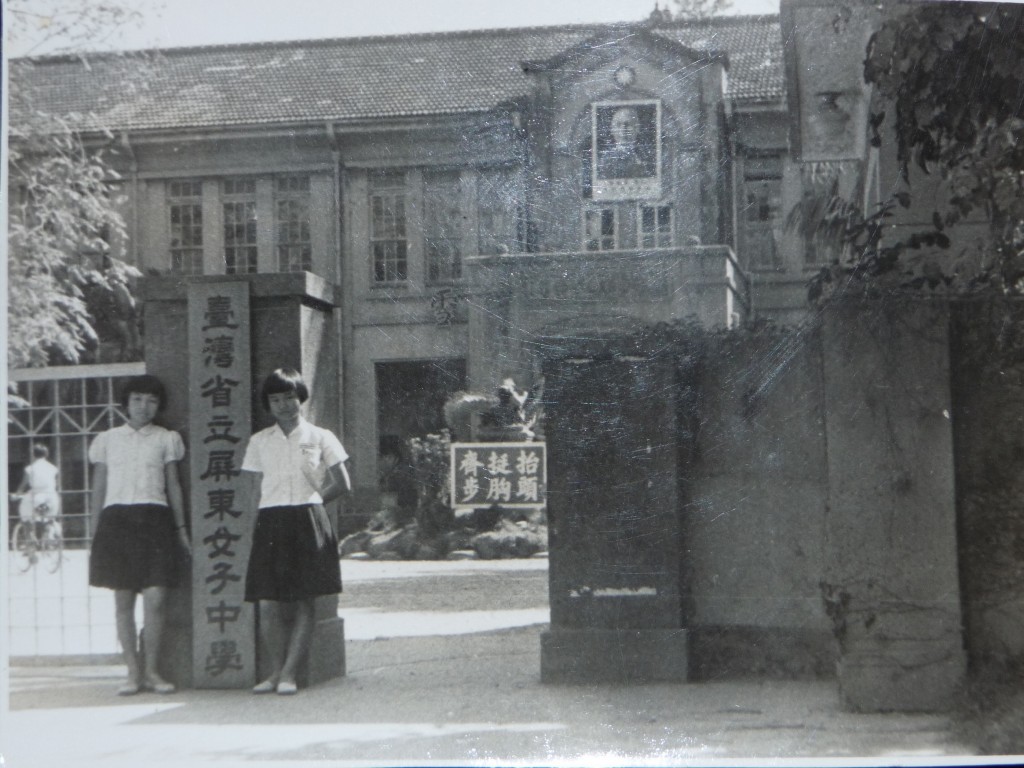
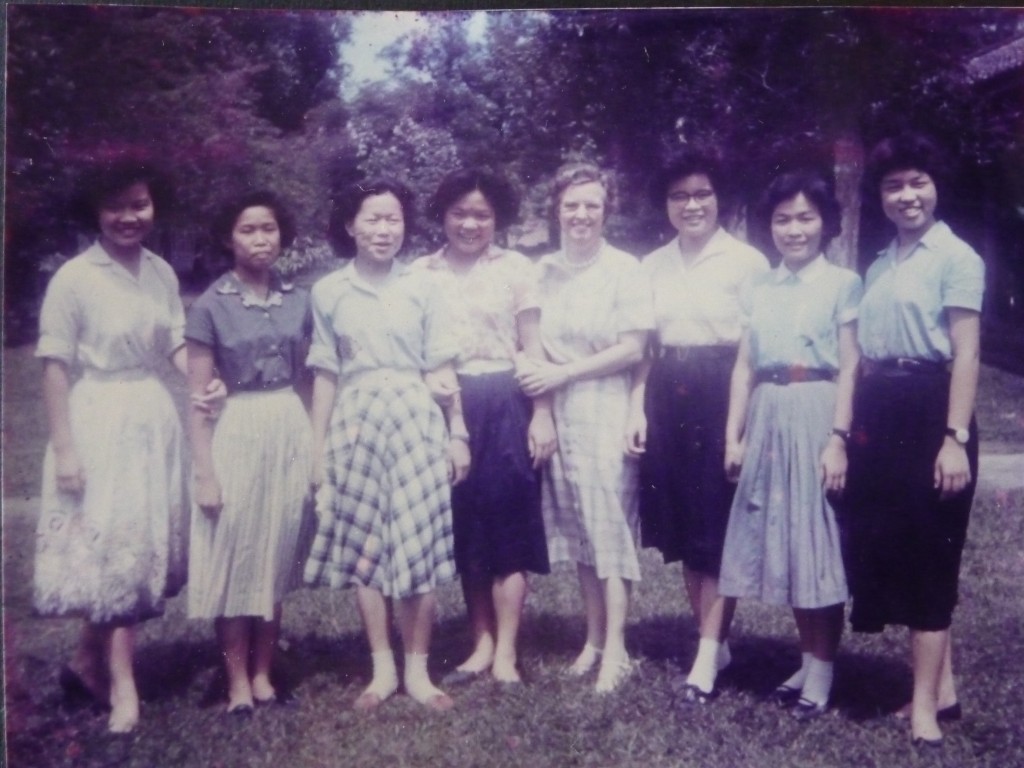
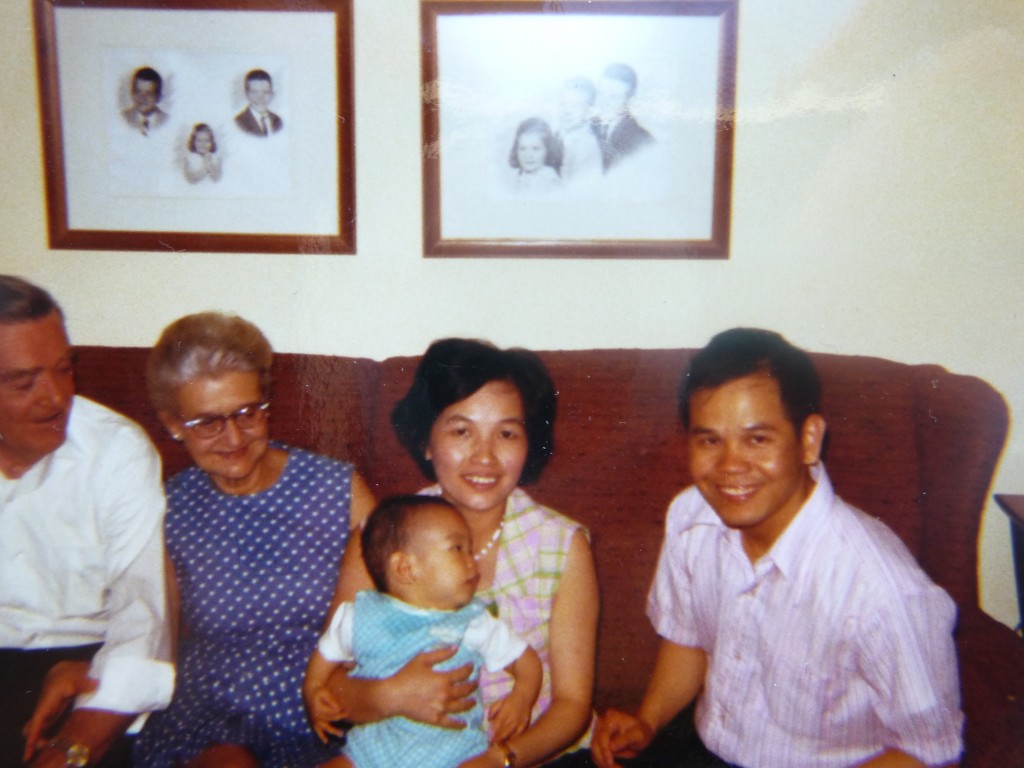
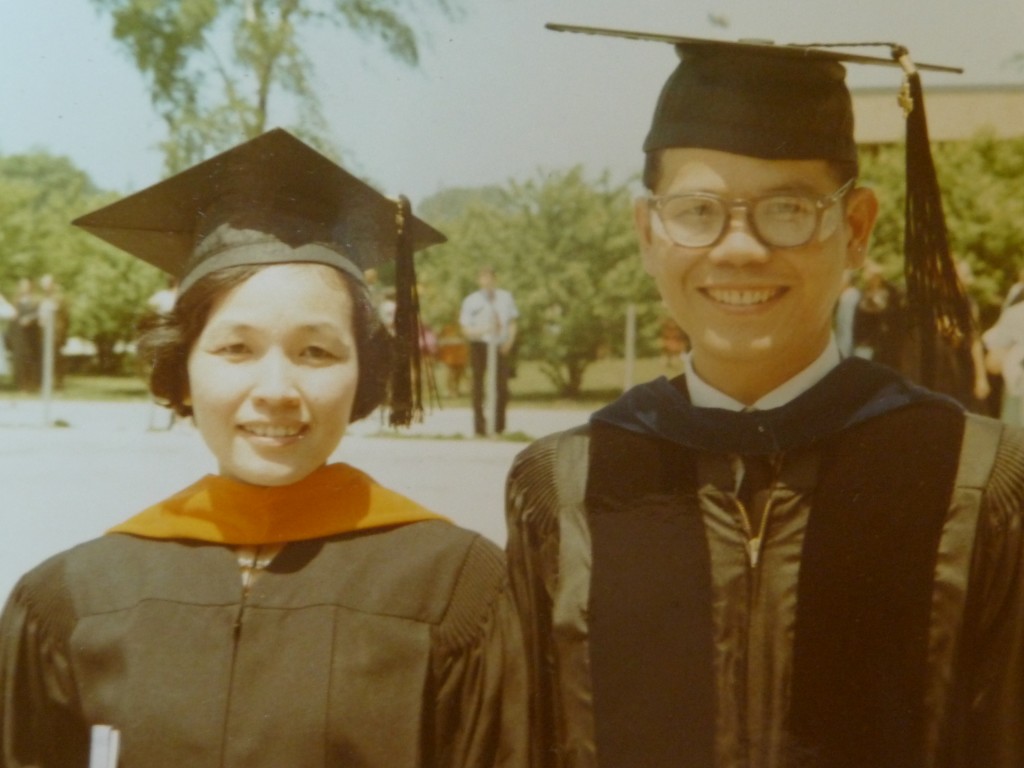
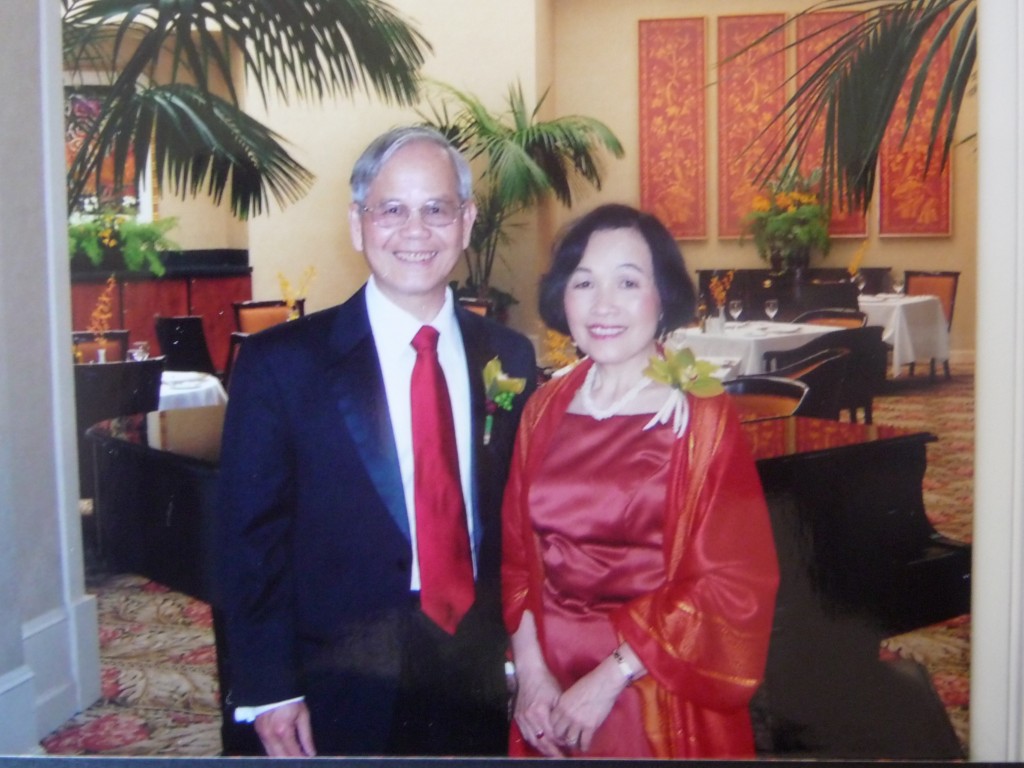
Source: Christine Yang, written in the East Bay, northern CA, 5/2/2015
Translated from: 242. 一個来自泗溝水鄉下的女孩/林壽英/2015/05 by Sky Ford
Posted 1/19/2021


